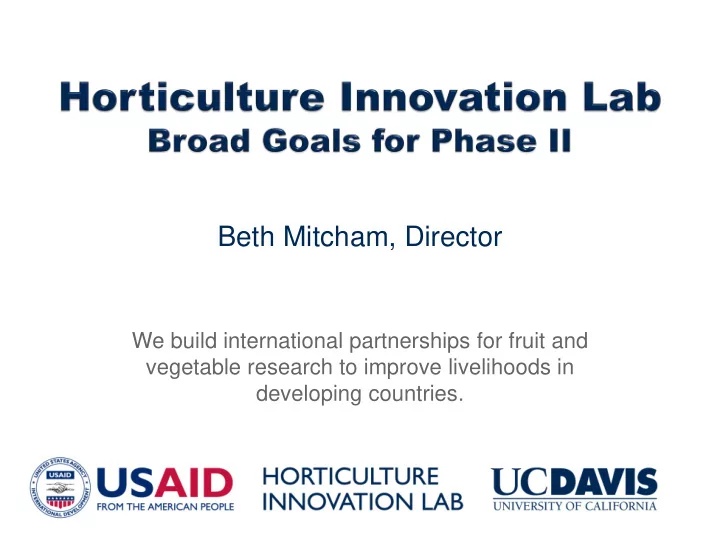

Beth Mitcham, Director We build international partnerships for fruit and vegetable research to improve livelihoods in developing countries. Meeting Title/Date 1
Management Entity International Advisory Board Project PIs and collaborators ◦ As projects are introduced 2
Horticultural value chain research Innovation and scaling Capacity building Nutrition sensitive horticulture Empowering women and the most vulnerable Sharing information 3
Africa: Kenya , Tanzania , Uganda, and Zambia Central America and the Caribbean: Guatemala and Honduras Asia: Bangladesh , Cambodia, Nepal, Thailand 4
Project plans: ◦ 3 long-term research projects on gender, nutrition and postharvest ◦ Spin-off/Scaling projects (5) ◦ USAID Mission service projects (5) ◦ Additional Projects (years 3-5) Mixed animal-horticulture systems, value chains, food safety, and capacity building 5
Developing small-scale irrigation solutions (Uganda) – Kate Scow, UCDavis Expanding tomato grafting for entrepreneurship (Honduras & Guatemala) – Jim Nienhuis, Univ. Wisconsin Incentives and markets for vegetable smallholders to practice labor, water and soil saving technologies (Nepal & Cambodia) – Manuel Reyes, North Carolina A&T 6
Empowering women through horticulture (Honduras) – Janelle Larson, Penn State Univ. Improving nutrition with African Indigenous Vegetables (Kenya & Zambia) – Jim Simon, Rutgers Univ. Trellis Fund - 14 projects in 2015 7
Nutrition, aquaculture and horticulture project (Bangladesh) – Associate Award with Tufts University Innovative potato storage for smallholder farmers in Bangladesh – Associate Award with CIP – Ron Voss & Michael Reid, UC Davis MasRiego (Guatemala) – Associate Award – Manuel Reyes at North Carolina A&T and iDE Honduras, Zamorano, Universisdad Rafael Landivar 8
Two technologies selected for scaling project ◦ Drying beads ◦ Agro-nets Engaged Richard Kohl to assist with scaling plan development Meeting at UC Davis in fall Traveled to country with project leaders to meet with stakeholders and refine scaling plan 9
High humidity reduces seed viability and encourages aflatoxin development and insect activity Drying beads ◦ Made of special type of zeolite clay that absorbs water ◦ Can be reused indefinitely ◦ Can be used for seeds and food products Can dry products to very low moisture content Increased yield and germination/no aflatoxin or insect damage 10
Va Vario rious Applica licatio ion Methods 11
Insects reduce crop yield Pest exclusion nets ◦ Create a barrier that protects vegetables against pests ◦ Improve ambient conditions ◦ Can be locally made and reused Farmers are able to implement nets into an Integrated Pest Management program that relies less on pesticides 12
13
Build connections between regional horticultural players Established in recognized regional institutions Regional foci for Horticulture Innovation Lab activities ◦ Training ◦ Research ◦ Outreach ◦ Information 14
Central America ◦ Zamorano University, Honduras Southeast Asia Center ◦ Kasetsart University, Thailand Africa Center ◦ Under development We were innovation before innovation was cool! 15
Please use the logo block on all signage, reports, brochures, etc. Please do not abbreviate our name shorter than Horticulture Innovation Lab (especially not HIL or Hort IL) Please share project photos and summaries with Brenda Dawson 16
For your contributions to the success of the Horticulture Innovation Lab Connect on Twitter: @HortInnovLab On Facebook.com/HortInnovLab Videos on YouTube.com/HortCRSP Subscribe to our newsletter: http://blog.horticulture.ucdavis.edu 17
Recommend
More recommend